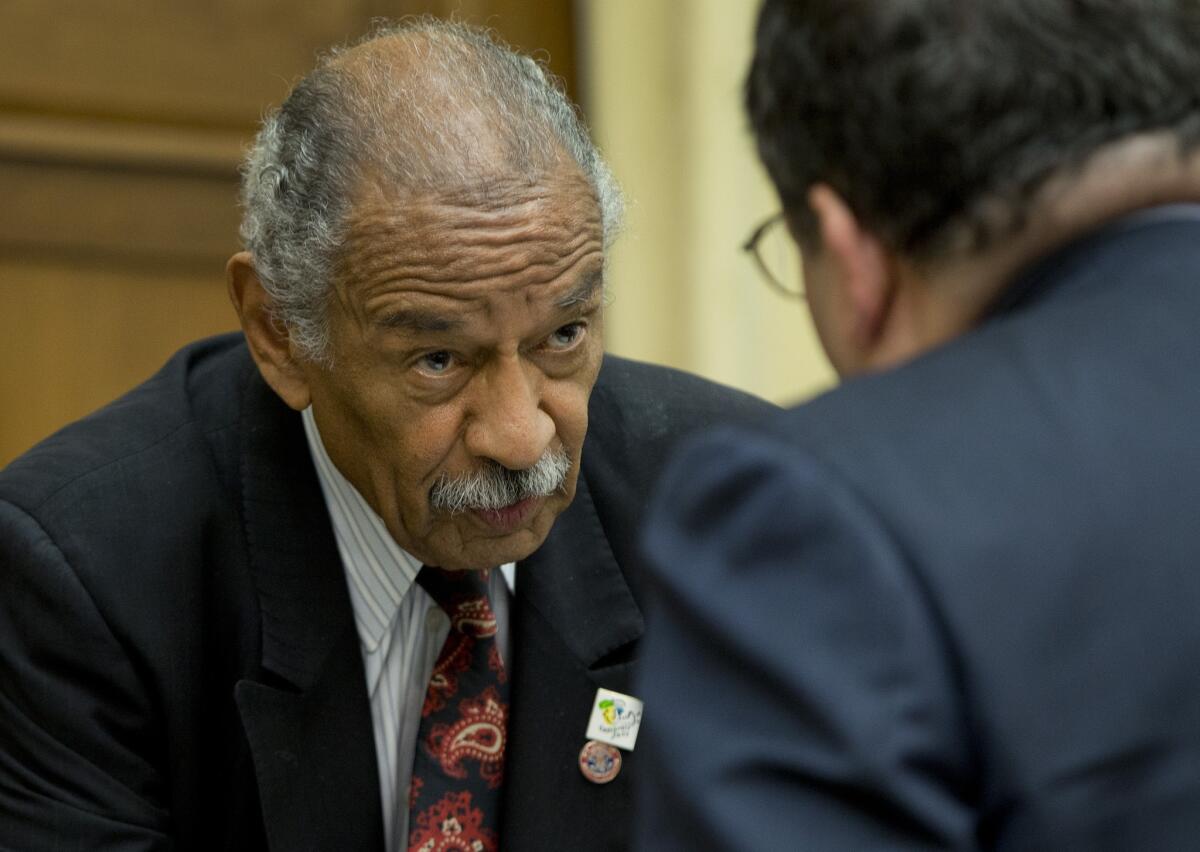Rep. John Conyers, most senior member of House, resigns amid accusations of sexual harassment

Rep. John Conyers Jr. of Michigan, the longest-serving member of the House of Representatives, resigned Tuesday after his support among fellow Democrats collapsed amid accusations of sexual harassment by several female employees.
Conyers endorsed his son, John Conyers III, in a rambling radio interview with Detroit host Mildred Gaddis.
“I am retiring today, and I want everyone to know how much I appreciate the support, incredible undiminished support I’ve received,” Conyers said.
Conyers’ use of the word “retiring” rather than “resigning” left some uncertainty over when he was vacating the congressional seat he has held since 1965. Later in the day, however, he sent a letter to congressional leaders saying he was stepping down “effective today.”
Conyers’ replacement will be chosen in a special election.
The Detroit-area seat is strongly Democratic, so Conyers’ departure will not affect the balance of power in the House. But it does set up a potential family fight: While the congressman endorsed his son to succeed him, a great-nephew, state Sen. Ian Conyers, has publicly said he intended to seek the seat.
The announcement by John Conyers came after House Minority Leader Nancy Pelosi (D-San Francisco), fellow Congressional Black Caucus leader Rep. James Clyburn (D-S.C.) and increasing numbers of House members urged him to quit as former aides offered detailed accounts of inappropriate sexual advances he had made over decades.
A longtime civil rights activist — the only remaining member of Congress who was elected in the 1960s — Conyers is the highest-profile political figure to be forced from office in the midst of a national debate over sexual harassment that began weeks ago with accusations against movie producer Harvey Weinstein.
Conyers has continued to deny any wrongdoing, although on Nov. 26, he agreed to step down as the top Democrat on the House Judiciary Committee in what served as the first acknowledgment of his vulnerability.
The accusations against Conyers, who is 88, had preoccupied members of the Democratic leadership, who were reluctant to be seen pushing out a leading African American member of Congress who was widely respected for his advocacy.
At the same time, Democratic activists have been pushing for the party to take the lead in cracking down on sexual misconduct. Democrats have been trying to argue that voters in Alabama should turn aside the Republican candidate for the U.S. Senate, Roy Moore, because of accusations by several women that he had made advances on them when they were teenagers and he was in his 30s. One of the women has accused Moore of a sexual assault.
The disclosure of accusations against Conyers began on Nov. 20 when BuzzFeed reported that in 2015, he had used $27,000 in taxpayer money to settle a wrongful dismissal complaint made by a female aide, Marion Brown, who said she was fired for not giving in to his sexual advances.
Several other former aides, including his former deputy chief of staff, Deanna Maher, subsequently came forward, saying that Conyers had demanded sexual favors or touched them inappropriately.
Adding to the accusations, a well-known Washington ethics lawyer, Melanie Sloan, said that when she worked for Conyers two decades ago, he had discriminated against her because of her gender, publicly berating her and at one point ordering her to babysit his child. Conyers also called her to a meeting at which he showed up dressed in a shirt and underwear, she said.
Democratic leaders at first circled protectively around Conyers, but as the number of accounts grew, members of his party began calling for his departure.
“It is not easy for me to reach this conclusion because, as a civil rights activist, I have looked up to Rep. Conyers for decades. I believe these women, I see the pattern, and there is only one conclusion: Rep. Conyers must resign,” Rep. Pramila Jayapal, a Democrat from Washington state who is also a member of the Judiciary Committee, said last week as she became the second House Democrat to call for Conyers to step down.
Pelosi was blistered by other party members after she initially appeared to minimize the complaints against Conyers in a Nov. 26 appearance on NBC’s “Meet the Press.”
In that interview, Pelosi cast Conyers as “an icon in our country” who had worked to secure rights for women and was confronting a host of unverified accusations.
“I don’t know who they are. Do you?” she said of the women. “They have not really come forward. That’s for the Ethics Committee to review.”
Sloan, the ethics lawyer who had accused Conyers, said that Pelosi later called her to apologize. Pelosi then issued a statement insisting that harassment victims — including any who had signed nondisclosure agreements involving Conyers — should be able to talk openly about their experiences.
Four days after her initial defense of the congressman, Pelosi called for his resignation.
“The brave women who came forward are owed justice,” she said.
The public turnabout by others in the House was no less abrupt. On Nov. 25, Clyburn, like Conyers a heralded civil rights figure, had raised questions about the veracity of the accusers. The next day — after watching Brown, the recipient of the wrongful termination settlement, discuss Conyers’ actions on NBC’s “Today” show — Clyburn called on him to resign.
Conyers, on Tuesday’s radio show, was emphatic that his legacy would not be diminished because of the allegations against him — though inevitably it will be.
“My legacy can’t be compromised or diminished in any way by what we are going through now,” he said. “I want you to know that my legacy will continue through my children.”
He also called for a public airing of settlements paid by other members of Congress as a result of sexual harassment allegations. The settlement involving Conyers became public because he used money from his congressional account to pay the former aide. Other settlements have been paid from a centralized House account and remain secret.
“There should be a complete disclosure and revealing to all of the citizens of the country of what federal legislators are doing or not doing,” he said.
For more on politics from Cathleen Decker »
Twitter: @cathleendecker
ALSO:
Climate scientists see alarming new threat to California
Updates on California politics
UPDATES:
11:55 a.m.: This article was updated with Conyers’ official letter of resignation.
8:40 a.m.: This article was updated with additional comments from lawmakers and details on the procedure for filling Conyers’ seat.
8 a.m.: This article was updated with additional details, including comments from Conyers.
This article was originally published at 7:40 a.m.
More to Read
Get the L.A. Times Politics newsletter
Deeply reported insights into legislation, politics and policy from Sacramento, Washington and beyond. In your inbox three times per week.
You may occasionally receive promotional content from the Los Angeles Times.







